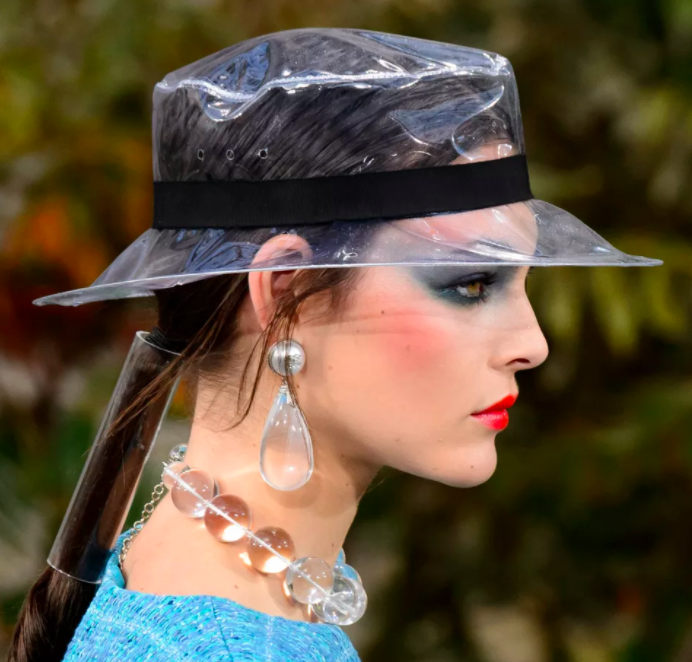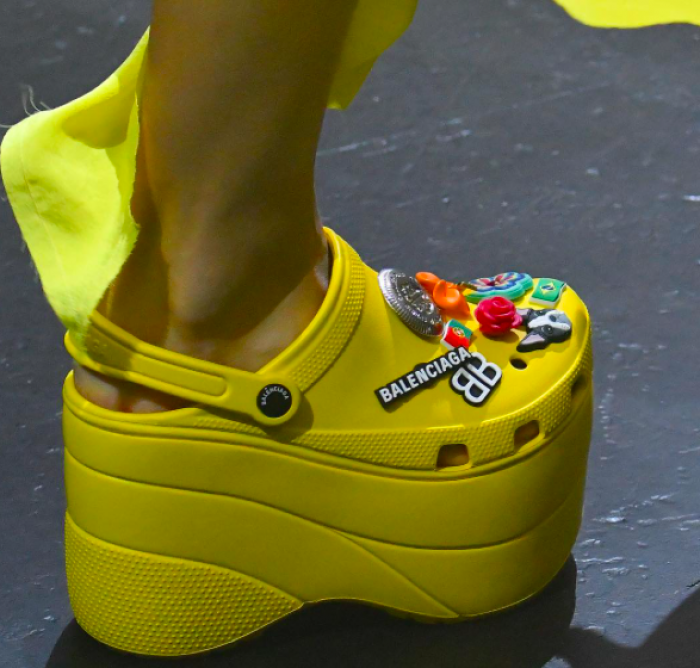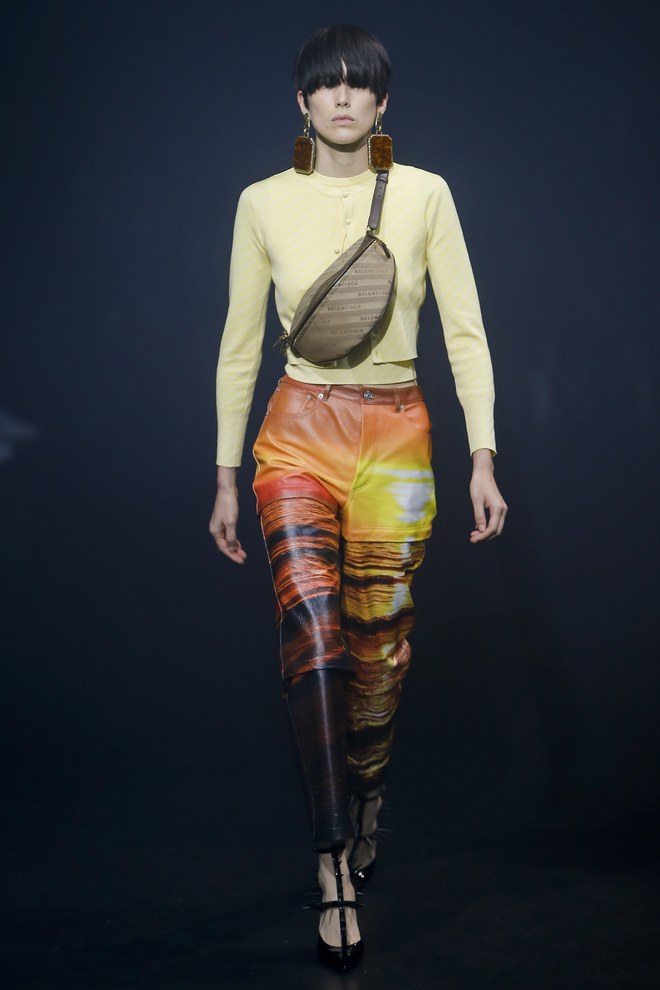So much of the clothing on display at the SS18 Fashion Month was deliciously horrid. The garish, the aesthetically challenged and the downright repellent flapped its way down the runway: sunset-printed trousers, heeled thong shoes and thigh-grazing PVC boots amongst the worst offenders. Disproportionately clumpy ‘dad’ trainers were fastened on the legs of every supermodel IT-girl, while rhinestone sunglasses accessorised shiny, tacky suits and gaudy logo-ed tees.

Balenciaga broke the internet when they sent a pair of towering platform Crocs in bubblegum pink down the runway. Here it was, the most aesthetically maligned shoe of all, presented as a sick joke and real-life clickbait. It was also the perfect embodiment of fashion’s biggest obsession right now: the out-and-out ugly.
But platform Crocs are merely the tip of the iceberg; awkward shapes, mismatched maximalism, lurid colours, clunky shoes and bumbags are everywhere. Heinous is so hot right now. Could it be that the kind of enduring elegance that transcends ever-changing trends has got boring? Or perhaps the slippery concept of beauty is transforming through its cyclical nature at a pace too fast for us to keep up with.

Relishing in the misbegotten and the banal can be traced back to the rise of normcore – the anti-fashion answer to fashion, which ironically, became fashionable. Coined by trend-forecasting agency K-Hole in 2014, normcore welcomed the now-ubiquitous, flavourless, nondescript uniform of mom jeans and white sneakers.
Fashion’s fascination with the repellent, I’d argue, stems from our growing cultural desperation to be unique, to stand out in the ocean of street style stars and social media influencers. Traditionally, fashion’s resources were limited to New York, London, Milan and Paris, but Instagram has given rise to fashion stars everywhere, and on demand. As such, the game of fashion has become a ruthless battle for attention, with people increasingly looking to stand out and make a statement. Building a personal brand that’s unique is no longer the preoccupation of just fashion bloggers and stylists, everyone is looking for something that speaks of who they are, something customised, something special.

Part of the attraction of the so-called ugly is that the designs are anything but bland. With ugly, there is no danger of being ‘basic,’ an insult that’s recently swept into the mainstream, largely used by the Instagram-consuming Generation Y. ‘Basic’ is fashion’s ultimate enemy. It’s boring, it’s bland, or worse, it’s attainable. If anyone can pull it off, it can be anyone’s style, and ‘anyone’s style’ just won’t cut it in a world where anyone with access to a smartphone can be an influencer/blogger/curator. For better or for worse, nothing gets attention like something outrageous, or better, something downright ugly.
Of course, if something is garnering mass attention on social media, designers are quick to jump on the sartorial bandwagon. As such, many of today’s designers are turning away from the traditionally beautiful, in favour of outrageously out-there pieces. Like Manolo Blahnik’s boot-pants, Gucci’s gaudy excess in the form of sparkling unitards and music-note appliqued jackets, and practically everything from the Demna Gvasalia-headed brands Vetements and Balenciaga. You see, the trend-setting baton no longer belongs exclusively to designers. Indeed, movements such as normcore were born not on the catwalk, but on the street.
That said, while the rise of ‘ugly’ is in part due to big brands answering the demand for the social-media driven embracement of the oddball, labels – like individuals – are also looking for a way to shock; to stand out; to catch the consumer’s eye that (due to Instagram) has seen almost everything. The brands getting the most attention are those promoting products that shock and awe due to their unconventionality. It’s this self-perpetuating cycle that has lead to designs that conventionally reek of bad-taste.
The idealist in me would like to see the rise of ugly fashion as more than simply a Millennial marketing tool. I question whether designers are just relishing in the aesthetically challenged to be controversial, to make headlines and incite social media attention. Could it, perhaps, have more to do with freeing oneself of the shackles of ‘good taste,’ as a way to be more expressive, or more significantly, as a way to challenge the often-narrow conventions of beauty? I posited the question recently in response to Balenciaga’s reimagining of the foam Croc. One thing is for sure, the emphasis on individuality is calling into question all traditional notions of what we once considered ‘beautiful.’
More and more, people are dressing for themselves, dressing to say something of who they are. This is particularly true of women. Historically female dress-codes have adhered to male standards of beauty, but ‘ugly’ fashion defies the male gaze, leaving a space for full self-identification. Fashion blogs such as ‘Man-Repeller’ have taken their cue from a style that wouldn’t traditionally be considered ‘pretty.’ Aggressively unglamourous is the new glamourous. And why not? We don’t owe it to anyone to dress according to the rules of ‘prettiness.’
Clothes have always been a tool of self-expression and, often, a tool of empowerment. In a world where the over-saturation of social media makes originality hard-pressed to find, it’s no wonder that ‘ugly’ is having its moment. And who decides what is ugly anyway? So much of what was once condemned becomes desirable. After all, that is how fashion works: preferences shift, the uncool becomes covetable, our eye adjusts and pre-conceptions are redefined, over and over. Social media merely amplifies this process.
One thing is for sure: what would be ugly is if everyone looked the same.






